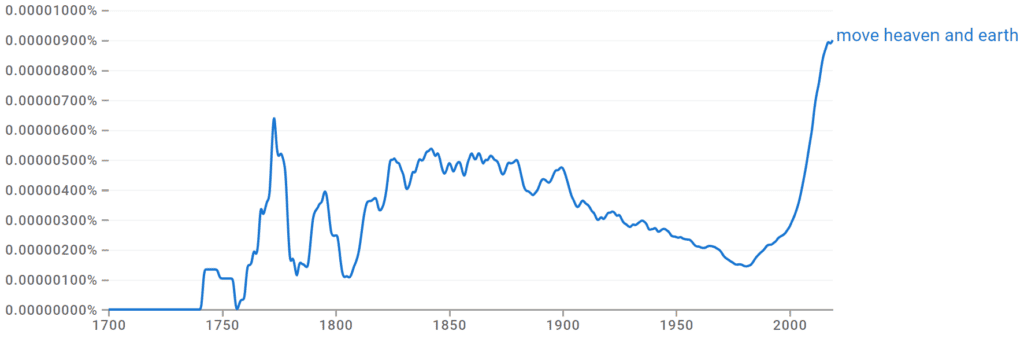To move heaven and earth means that someone is putting all their efforts, abilities, and hopes into getting something accomplished. For example, if you are determined to graduate from college despite some hardships, you might say you will move heaven and earth to walk across that stage for your diploma.
Idioms like this one are phrases or expressions whose meaning cannot be understood from the ordinary meanings of their individual words. They are commonly used in English to add tone or emphasis to a point being made.
Keep reading to understand the meaning behind this term, its origins, and how to use it properly through examples in a sentence.
What Is the Meaning of Moving Heaven and Earth?

To move heaven and earth means to put tremendous effort into accomplishing something or to do everything one can to make something happen.
It is a hyperbole or exaggeration to describe a person’s effort.
For example:
- She moved heaven and earth for the famous celebrity to agree to an interview.
- They moved heaven and earth at the last moment to ensure her family was present during her stage debut.
- Sarah would move heaven and earth to ensure her child gets the best education possible.
- Even though the deadline was tight, the team moved heaven and earth to finish the project on time.
- I know he’s truly committed; he’d move heaven and earth to keep his promises.
It is also commonly used to explain a difficult situation or an impossibility.
For example:
- To make that purchase, I would have to move heaven and earth, and there simply isn’t enough money.
- Even if we were to move heaven and earth, solving this intricate puzzle in under a minute seems nearly impossible.
- They tried to reconcile their differences, but moving heaven and earth would have been easier than finding common ground between them.
Move Heaven and Earth Origins

Although its exact origins are unknown, the expression “move heaven and earth” is from the late 18th century and was used to describe “extraordinary efforts.”
Used as hyperbole even then, it was considered cliche, or overused, by the late 1880s, as we can see in Anstey’s “The Tinted Venus,” a farcical romance, in 1885:
There’s the police moving heaven and earth to get you back again.
Some attribute the idiom to a passage in the Bible, Haggai 2:6:
“…I will shake the heavens, and the earth, and the sea, and the dry land…
Others believe it is related to Archimedes’ statement:
Give me a lever long enough and a fulcrum on which to place it, and I shall move the world.
No matter the origins, however, the expression has been popular for quite a while and is well-recognized as a figurative way to describe a great effort.
Let’s Review
Despite its questionable start, the hyperbolic idiom “move heaven and earth” has been documented in use for over 200 years. It means to place tremendous effort into something and can be used to exaggerate the difficulty of a situation.
It has no liberal inception, but various uses in historical and cultural documents have highlighted variations of the phrase that could be where it was first introduced.
